Duration
Off-Grid Sri Lanka: Remote Wildlife & Rural Immersion
From $1,225 pp
Bookable From
Year-round
Trip Style
Privately Guided
Country
Sri Lanka
Physical Rating
Easy
Overview
Journey off-grid into Sri Lanka’s nature and villages for wildlife adventures in remote areas and rural immersion in authentic villages.
Experience the wild soul of Sri Lanka on an unforgettable 9-day journey guided by nature and fueled by adventure! You'll see the wildest corners of Sri Lanka, where not many other tourists go, as you visit its rainforests, open plains, and quiet villages.
Wander the lush trails of Sinharaja Rainforest, alive with rare birds and rich biodiversity, then venture into the island’s remote southeast for thrilling safaris where elephants, leopards, and sloth bears still roam free. Stay in the heart of real homes with warm local hosts, far from the crowds. With bush walks, motorbike rides, and forest adventures, this is your chance to truly explore nature up close: raw, real, and wildly rewarding.
Designed for 1–5 people, this adventure ensures personalized attention while minimizing the environmental impact. Ideal for travelers with moderate fitness who seek wildlife, nature, and cultural immersion rooted in real local life.
Highlights
- Explore Sinharaja Rainforest with expert guides to spot rare birds and vibrant wildlife
- Spot elephants, leopards, and bears on jeep safaris in quiet, remote national parks
- Experience thrilling motorbike safari rides through scenic wilderness landscapes
- Enjoy forest adventures far off the beaten path
- Discover rural life with visits to farming fields and plantations
- Connect with local traditions and rural communities along the way
- Stay in authentic homestays and treehouses, enjoying warm local hospitality far from crowds
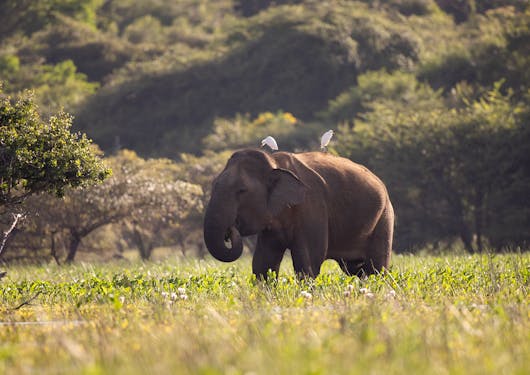
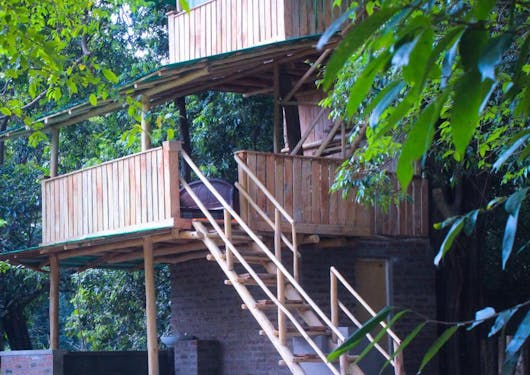
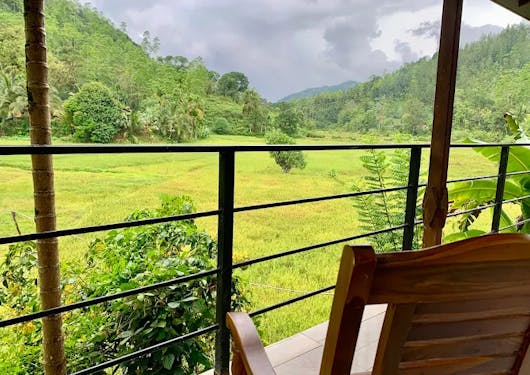
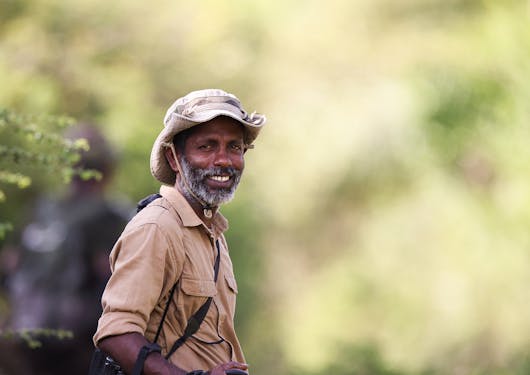
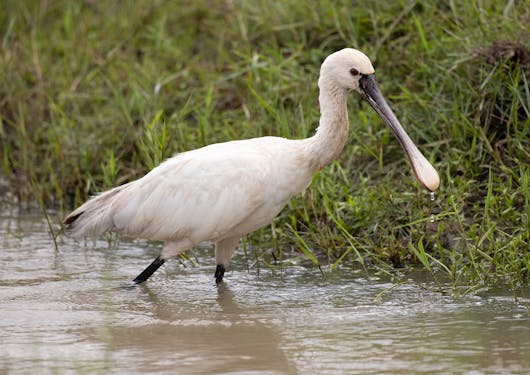
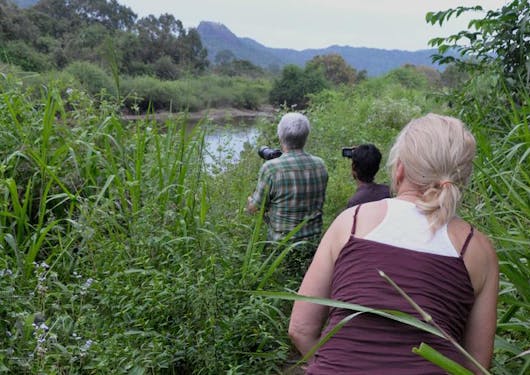
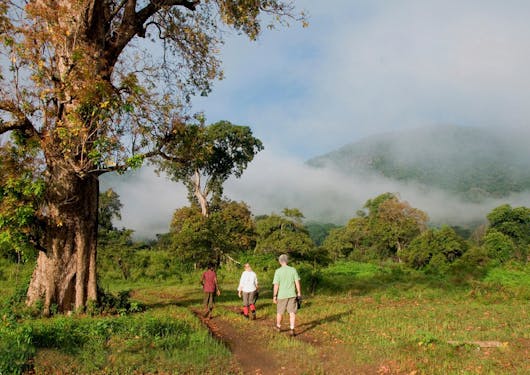
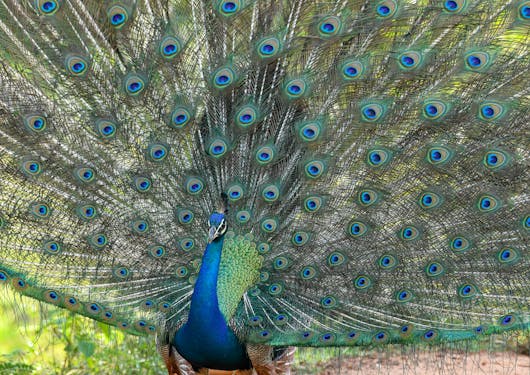
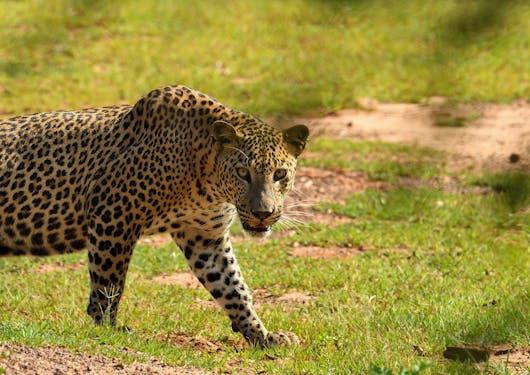
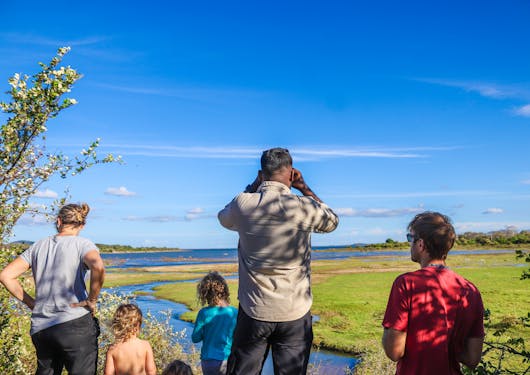
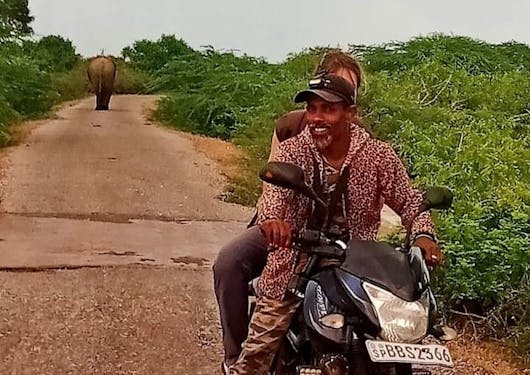
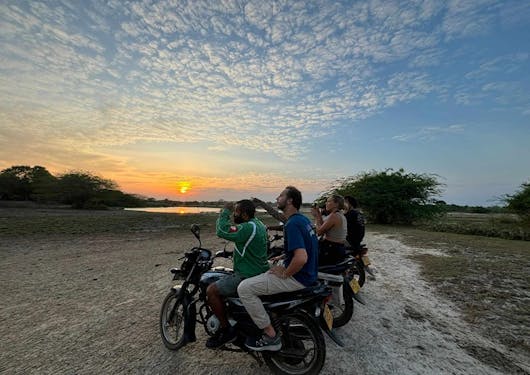
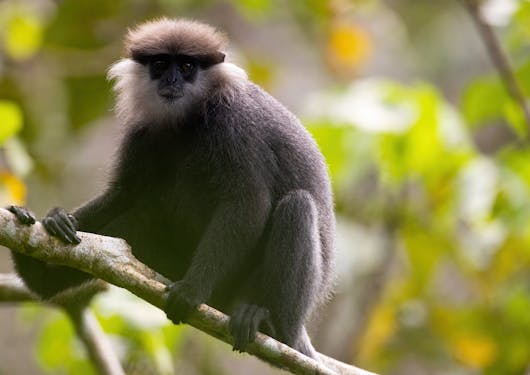
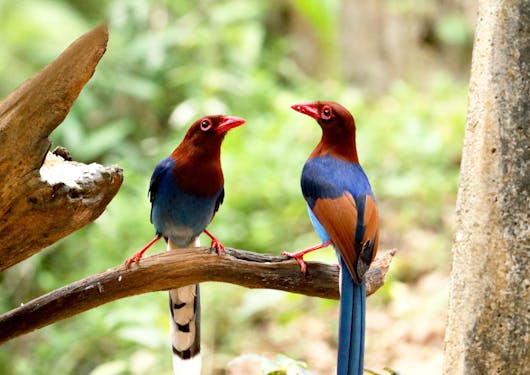
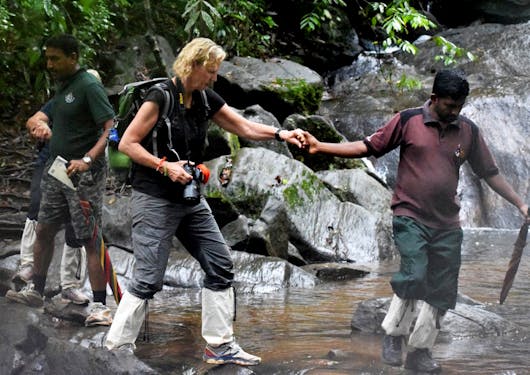
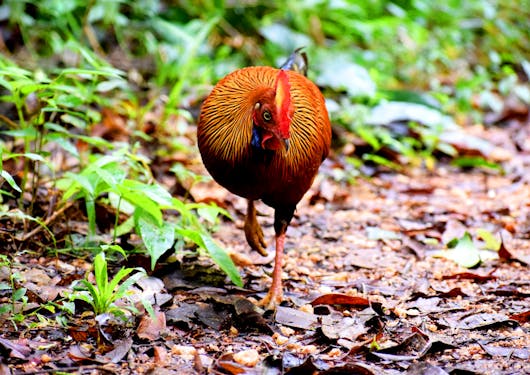
Discover Sri Lanka’s natural beauty and rich culture beyond the typical tourist paths. Stay at authentic homestays and eco-lodges, where you’ll connect directly with local families and experience Sri Lanka through their eyes. These will be simple, comfortable accommodations that will offer a peaceful retreat after each day’s adventures.
Highlights of this responsible wildlife adventure include thrilling motorbike safari rides through rugged landscapes alongside guided exploration of the UNESCO-listed Sinharaja Rainforest. Sri Lanka's remote national parks are home to elephants, leopards, and sloth bears, each of which you may see in their natural habitat during jeep safaris. You'll also visit rural farms and plantations that showcase traditional ways of life still practiced today.
Supporting local communities and conservation efforts, this journey delivers unforgettable encounters with Sri Lanka’s stunning wildlife and landscapes.
Seasonal Notes
This experience runs year-round, but the best wildlife viewing is typically from May to September, when the weather is drier in the southeast, and animals are more active around water sources. This is a great time for safaris in Lunugamvehera and Yala Block 5, with better chances of spotting elephants and even leopards.
The Sinharaja Rainforest, being a wet-zone forest, receives rainfall throughout the year. Treks here are possible in any season, but trails may be muddy and leeches more active during wetter months (April to June and October to November). Waterproof footwear and leech socks are recommended.
Birdwatching is rewarding year-round, though migratory species are more common from October to March. Temperatures remain warm year-round, with daytime highs between 82-93°F (28–34°C) depending on the region.
If you’re comfortable with a bit of rain and keen on quieter trails and lush greenery, the off-season offers a wilder, more atmospheric experience with fewer visitors.
Itinerary
Day 1 Colombo to Negombo (arrival day)
Day 2 Sinharaja - Slow Down in a Rural Village
Day 3 Sinharaja - Trek through the Sinharaja Rainforest
Day 4 Bundala - Birdwatching & Motorbike Safari in Bundala National Park
Day 5 Bundala - Bush Walk & Birdwatching Jeep Safari
Day 6 Buttala - Remote Agrotourism Exploration
Day 7 Buttala - Full-day Safari through Quiet National Parks
Day 8 Buttala to Colombo - Leisure Time
Day 9 Colombo (departure day)
Customization
Route Map

Inclusions & Exclusions
Meet and assistance at the Colombo International Airport
All transfers by an air-conditioned vehicle
Driver and vehicle throughout
English-speaking local guide throughout the tour
All applicable Taxes
1 night in Negombo (Homestay); 2 nights in Sinharaja (Homestay); 2 nights in Bundala (Treehouse Cabin); 2 nights in Buttala (Ecolodge); 1 night in Colombo (Guesthouse)
D3: Guided Trek through Sinharaja Rainforest
D4: Evening Guided Motor Bike Safari
D5: Guided Bush Walk through the forests
D5, D7x2: Jeep Safaris in 3 National Parks
D6: Agrotourism Exploration
Connect with local traditions and communities
8 breakfasts
6 lunches
6 dinners
24/7 emergency contact and customer service
Reusable water bottles
Transportation & Guides
Accomodations
Activities & Experiences
Meals
Additional Services
International airfare
Services and meals not mentioned in the itinerary
Early check-in, late check-out, and other hotel extras
All alcoholic and non-alcoholic beverages at the hotel
Personal expenses
Tips for guides and hotel staff
Visa fees or travel documentation
Travel insurance
Pricing
Prices exclude flights to/from the destination.
Prices are for double room occupancy unless indicated otherwise.
Contact us for pricing for groups larger than 4.
Deposit per person
30% of the trip price
Group of 2-3 travelers - price per person
$1,675
Group of 4 Travelers - price per person
$1,225
Single Supplement
$125
Payment & Cancellation Policy
This trip is available year-round.
At checkout, choose your preferred departure date and pay the deposit. Yugen Earthside’s standard Payment & Cancellation Policy applies.
Book With Confidence
- Your deposit is fully refundable for 30 days when you book 120+ days in advance and pay by bank transfer.
- If you pay by credit card, the card processing fees are non-refundable.
- We’ll confirm availability for your chosen dates within 3 business days. If confirmed, you’re all set! If not, we’ll help you adjust your dates or refund your deposit.
Sustainability
We are a Sri Lankan company locally owned by a husband and wife team. We specialize in creating authentic experiences. Our mission is to create meaningful journeys that connect travelers with the heart and soul of the island—its people, culture, nature, and traditions—while ensuring that tourism directly benefits the local communities who make these experiences possible.
We believe that travel should be a force for good. That’s why we carefully design our tours to immerse travelers in real local life—from sharing home-cooked meals and discovering lesser-known trails to staying in locally owned, small-scale hotels. These choices ensure that the true stakeholders of tourism—the local people—are supported and empowered.
Our commitment to responsible travel is unwavering. We proudly say no to animal exploitation and staged experiences. We do not promote elephant rides, bullock cart rides, turtle hatcheries with captive animals, or any activity that involves cruelty or profit from animal suffering. We also do not propose or endorse shopping stops, as our sole focus is to deliver authentic, distraction-free travel experiences.
Sustainability isn’t just a principle for us—it’s our path forward. Whether it’s minimizing plastic waste, reducing our carbon footprint through low-impact travel, or promoting eco-conscious practices on the trail, we are dedicated to preserving Sri Lanka’s natural and cultural heritage for generations to come.
Environmental Initiatives
This journey is designed to promote responsible travel in sensitive natural areas, with a focus on conservation and minimal environmental impact.
- The itinerary includes visits to less-traveled national parks and protected forests, supporting low-density tourism that eases pressure on heavily visited sites.
- Accommodations are small-scale and eco-conscious, including treehouse cabins and open-air lodges that reduce energy use and blend into the natural landscape.
- Activities such as guided bush walks and rainforest treks are conducted with trained local naturalists, helping travelers understand local ecosystems and the importance of protecting them.
- Meals are sourced locally and served with minimal packaging, helping reduce food miles and single-use plastics.
- Travelers are encouraged to follow “leave no trace” principles, use refillable water bottles, and engage respectfully with nature.
Accommodation Initiatives
Most accommodations are family-run homestays and small-scale forest lodges, not commercial hotels, which means your visit directly benefits local households and rural communities.
- Properties use minimal-impact infrastructure, often built with local materials and designed to blend into the natural surroundings.
- Treehouse and forest cabins are open-air and naturally ventilated, reducing the need for air conditioning.
- Home-cooked meals feature locally grown produce, reducing transport emissions and supporting nearby farms.
- Hosts are committed to low-waste practices, including reduced plastic use and responsible water management.
- Staying in small, locally owned places also limits over-tourism and distributes income more fairly across regions.
Sociocultural Initiatives
There will be many opportunities for cultural exchange and local connection during your tour. Travelers leave with a deeper understanding of Sri Lanka’s cultural richness, while locals benefit from tourism that values their heritage rather than commercializes it.
- Homestay accommodations allow you to engage with local families, learn about daily life, and experience genuine Sri Lankan hospitality.
- Meals are home-cooked using family recipes, giving insight into regional food culture and traditional cooking methods.
- Walks through villages, farms, and plantations introduce you to rural life and time-honored agricultural practices.
- All experiences are led by local hosts and guides, helping preserve indigenous knowledge, especially during rainforest walks and wildlife tracking.
Economic Initiatives
You will directly support local livelihoods and small-scale economies in rural Sri Lanka. By staying in homestays and working with locally owned safari operators, guides, and farmers, your travel spending goes straight to the communities you visit.
- Homestays and family-run lodges provide income to local hosts rather than hotel chains.
- Local guides and trackers are employed for treks, safaris, and nature walks, offering fair wages and supporting traditional knowledge.
- Meals are prepared by locals, often using ingredients sourced from nearby farms and home gardens.
- Visits to plantations and rural villages help promote smallholder agriculture and provide cultural exchange that benefits both travelers and locals.
Health & Safety
Be sure you have traveler's insurance.



